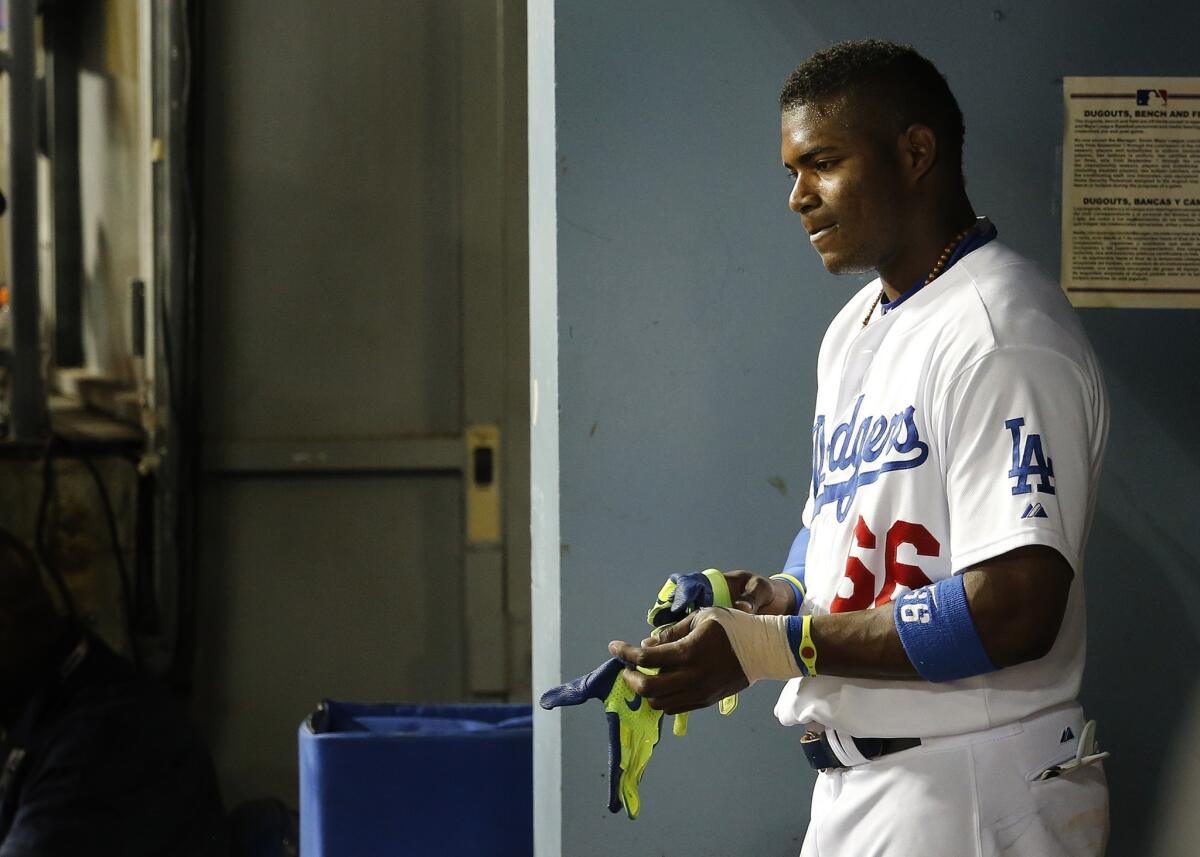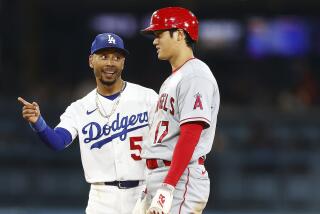Cuba could become top source of MLB talent with U.S. policy shift

- Share via
From the journey of Livan and Orlando Hernandez to the plight of Los Angeles Dodgers star Yasiel Puig, the slew of Cuban baseball prospects who have risked their lives to play in the major leagues has been well documented.
But with President Obama’s announcement that the U.S. and Cuba will move toward normalized diplomatic relations on Wednesday -- including an allowance for travel between the two nations -- baseball pundits are now wondering if the seismic policy shift will eventually put Cuba on a par with other Latin American nations that serve as fertile grounds for MLB talent.
The MLB released a brief statement on Wednesday acknowledging the change and opening the door for a more normalized talent flow from the Caribbean island nation to the U.S.
“While there are not sufficient details to make a realistic evaluation, we will continue to track this significant issue, and we will keep our clubs informed if this different direction may impact the manner in which they conduct business on issues related to Cuba,” the league said in a statement.
Although the shift might not change anything in the short term, former baseball agent Joe Kehoskie told The Times that the change could eventually put Cuba ahead of Venezuela and the Dominican Republic as a leading talent source for MLB clubs.
The issue for baseball was never the U.S. embargo with Cuba, though, Kehoskie said. It was Cuba’s refusal to allow players to join leagues around the world in the first place.
“To me the biggest question is, is Cuba at the point of making wholesale changes when it comes to its approach on professional sports?” he asked. “It’s not the U.S. or the embargo that has been keeping Cuban players out of MLB.”
Unlike the Dominican Republic and Venezuela, Cuba is home to an advanced amateur baseball system, Kehoskie said. Players are scouted from ages as young as 9, and if the children show above-average talent, Kehoskie said, they are steered toward special schools where sports are placed ahead of academics.
“In that one sense, Cuba is far ahead of its other Latin American baseball rivals,” he said.
Cuba’s main baseball organization is the Serie Nacional, a 16-team league with clubs in each of the country’s provinces and in the capital city, Havana. But after mass defections of players to the U.S. in the 1990s, Kehoskie said, the “cupboard is basically bare down there.”
“Many of those [Serie Nacional] teams don’t have a single prospect who would cut it in Major League Baseball,” Kehoskie said.
But in a decade, with another generation of talent born and cultivated on the island nation, Kehoskie said he wouldn’t be surprised if “Cuba becomes, or is, the No. 1 source of talent for Major League Baseball.”
Though the effect on Cuba’s talent flow remains a question, Kehoskie said the change in relations with the U.S. will certainly make it safer for Cuban nationals to attempt to sign contracts with MLB teams in the future.
In the 1990s, Kehoskie said, defections were most common at international baseball tournaments such as the Pan-Am Games or the Olympics. Players would meet scouts and then head to the U.S.
“Then in 2002, you flipped a light switch,” he said. “Players went from defecting at tournaments to defecting on speedboats.”
Many were stunned to hear of the way Puig traveled here to earn a contract with the Dodgers in 2012. A Los Angeles Magazine article published this year chronicled Puig’s flight, including a period when he was held hostage off the coast of Cancun, Mexico, by smugglers who threatened to dismember him with a machete.
Kehoskie said Puig’s plight, though shocking, is not as rare as it might seem. Many Cuban players have been held captive by smugglers for between three and nine months before they were allowed to enter the U.S. MLB rules stipulate that a player must establish residence in a country outside of Cuba before he can be signed by a U.S. club.
“If Cuban players are free to simply get on a plane and leave for MLB, it essentially puts the smugglers out of business, and the players would essentially become like any other professional player around the world,” Kehoskie said.
Follow @JamesQueallyLAT for breaking news.
More to Read
Go beyond the scoreboard
Get the latest on L.A.'s teams in the daily Sports Report newsletter.
You may occasionally receive promotional content from the Los Angeles Times.











